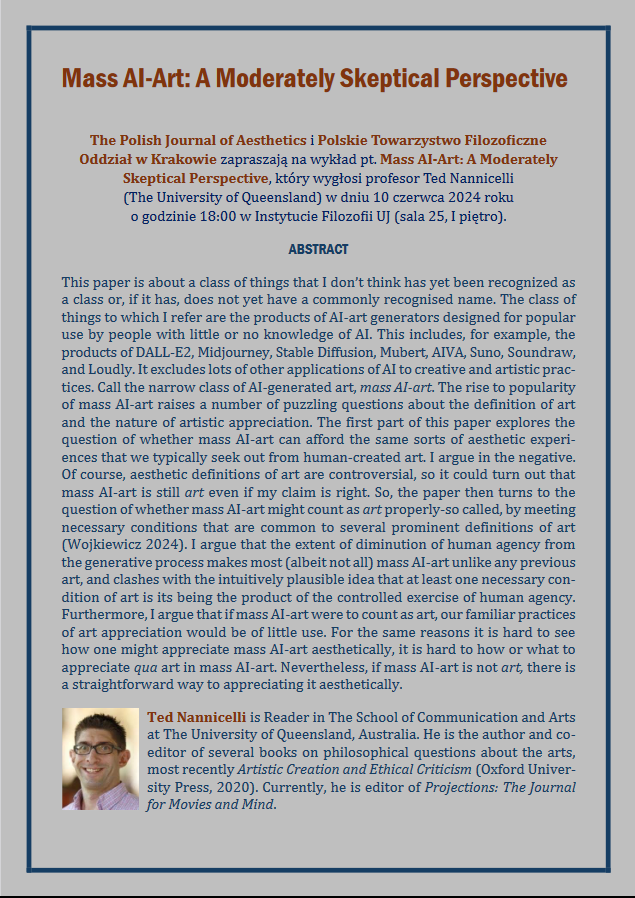The Polish Journal of Aesthetics i Polskie Towarzystwo Filozoficzne Oddział w Krakowie zapraszają na wykład pt. Mass AI-Art: A Moderately Skeptical Perspective, który wygłosi profesor Ted Nannicelli (The University of Queensland) w dniu 10 czerwca 2024 roku o godzinie 18:00 w Instytucie Filozofii UJ (sala 25, I piętro).
ABSTRACT
This paper is about a class of things that I don’t think has yet been recognized as a class or, if it has, does not yet have a commonly recognised name. The class of things to which I refer are the products of AI-art generators designed for popular use by people with little or no knowledge of AI. This includes, for ex-ample, the products of DALL-E2, Midjourney, Stable Diffusion, Mubert, AIVA, Suno, Soundraw, and Loudly. It excludes lots of other applications of AI to creative and artistic practices. Call the narrow class of AI-generated art, mass AI-art. The rise to popularity of mass AI-art raises a number of puzzling ques-tions about the definition of art and the nature of artistic appreciation. The first part of this paper explores the question of whether mass AI-art can afford the same sorts of aesthetic experiences that we typically seek out from human-created art. I argue in the negative. Of course, aesthetic definitions of art are controversial, so it could turn out that mass AI-art is still art even if my claim is right. So, the paper then turns to the question of whether mass AI-art might count as art properly-so called, by meeting necessary conditions that are com-mon to several prominent definitions of art (Wojkiewicz 2024). I argue that the extent of diminution of human agency from the generative process makes most (albeit not all) mass AI-art unlike any previous art, and clashes with the intui-tively plausible idea that at least one necessary condition of art is its being the product of the controlled exercise of human agency. Furthermore, I argue that if mass AI-art were to count as art, our familiar practices of art appreciation would be of little use. For the same reasons it is hard to see how one might appreciate mass AI-art aesthetically, it is hard to how or what to appreciate qua art in mass AI-art. Nevertheless, if mass AI-art is not art, there is a straightfor-ward way to appreciating it aesthetically.
Ted Nannicelli is Reader in The School of Communication and Arts at The University of Queensland, Australia. He is the author and co-editor of several books on philosophical questions about the arts, most recently Artistic Creation and Ethical Criticism (Oxford University Press, 2020). Currently, he is editor of Projections: The Journal for Movies and Mind.

